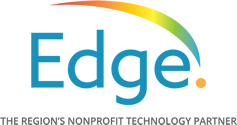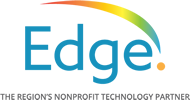Three Ideas for Innovation and Collaboration
To our Edge Community and Partners:
As the COVID-19 crisis continues to unfold, we at Edge are reaching out to our members, industry partners, and the wider education and public sector community to encourage innovative thinking and creative solutions to emergent problems. Below are three ideas to help our community resolve some urgent issues caused by the crisis and the actions we’ve all taken to slow its spread. These are not completely fleshed out and good thinking on the best ways to execute or improve upon the ideas are most welcome.
Please fill out this form if you would like to participate in one or more of the groups forming to support the initiatives below. The sooner you respond, the sooner mobilization can take place.
1. Reusable Surgical Mask Production using 3-D Printing Facilities
Overview
Personal Protective Equipment (PPE) is in short supply as the COVID-19 situation worsens throughout the state, putting front line healthcare workers, essential services personnel and the general public at greater risk.
Rowan University has nearly completed specifications for an approved and reusable mask that can be produced using 3-D printing. You can read about the Rowan project here. Whereas 3-D printers are deployed in Maker Space facilities and other locations throughout the higher education community (as well as some K-12 districts and local libraries), the potential exists to produce large volumes of these reusable masks through a coordinated effort.
Logistical Challenges to Solve
-
- The final 3-D printing specifications for reusable masks in use at Rowan University can be found here.
- Obtaining the 3-D printing materials for manufacture including:
- Print media (Rowan University is using PLA Plastic);
- Fabric filter material (Rowan University has consulted with ER staff at Cooper University Hospital to identify viable filter material – layers of sterile non-woven gauze and sponge – which are readily available supplies in ERs everywhere, and provide a sufficient mechanical barrier through which one can breathe comfortably.)
- Adjustable elastic bands to secure the masks (These have been the most difficult material to source and any ideas are more than welcome.)
- Obtaining a definitive inventory of 3-D printers available throughout NJ and gaining access to these facilities.
- Ensuring the safety of 3-D print operators with PPE gear.
- Documenting production inventories and distribution channels for all masks produced and prioritizing distribution to healthcare workers first, essential personnel second, and the general public third.
- Coordinating with Emergency Management Personnel in Municipal, County and State jurisdictions to determine need and handle distribution of the masks produced.
Please fill out this form if you would like to participate in this 3D printing initiative.
2. Drive Up WIFI Access
Overview
Access to the Internet is limited or non-existent for some among our students, faculty and staff as a by-product of the social distancing mandate for non-essential enterprises as well as the closure of our campus locations. It is the case, however, that public access to the Internet using “guest privileges” can be provided in public areas on many of our campuses, most specifically in parking lots and garages whereby authorized individuals may access these services from inside their cars and thus abide social distancing protocols. Such an initiative is already underway with Edge’s peer Research & Education Network in Maine – http://networkmaine.net/?p=480
Logistical Challenges to Solve
-
- College and University campuses often have guest WIFI coverage in public parking lots and garages
- The general public does not know where WIFI coverage is available on campuses
- Site maps with directions to these public WIFI locations may not exist and would need to be developed
- Coordination with Campus Safety and Security must be arranged and a protocol for registering vehicles wishing to use the Campus WIFI is required
- The public needs a single point of reference and website location to access WIFI site maps and to register their vehicles with Campus Safety & Security on participating campuses
Coordination and Communication
-
- Participating institutions will share links to the WIFI locations and automobile registration applications with Edge to organize and present to the public on its website
- Edge will prepare a press release and coordinate distribution/communication through social media channels, local news stations and state-wide newspapers (Star Ledger, Record, Trenton Times, Atlantic City Press)
Please fill out this form if you would like to participate in the drive up WiFi initiative.
3. Inter-Institutional Emergency Laptop Lending/Sharing Program
Overview
This document provides initial communication to our New Jersey Higher Education community regarding best practices and practical steps to sourcing and provisioning laptops to students and staff at our institutions that need them during this emergency situation.
The Challenge
The response to the COVID-19 outbreak has institutions and organizations scrambling to provide laptop computers to those who need them, and especially disadvantaged students who have relied upon those available on campus during normal business operations. The ability to accomplish this varies with a number of factors, including:
-
- Timely and accurate identification of those in need
- Timely and accurate documentation of the availability of suitable laptops equipped with necessary software licenses and subscriptions for those needing them
- Ability to sanitize and distribute functional laptops to the intended recipients in a manner that is in compliance with New Jersey’s social distancing mandates
- Accounting for the distributed laptops
- A plan for eventual retrieval of the distributed laptops
- Recommissioning (or return to lender if rented) and accounting of retrieved laptops, including sanitization of equipment, if necessary
Edge Advisory Response
Edge is actively monitoring the COVID-19 event in an ongoing effort to identify specific ways that we can assist our members. With respect to emergency laptop provisioning, we are focused on the following:
Communication and Coordination
-
- Our online EdgeXchange platform is an effective medium for information sharing among our members
- Our NJEdge.net corporate website and our EdgeMarket Portal will each contain information, updates and resources in support of your COVID-19 response
Determination of Need
-
- An emerging best practice to determine need is for the campus-based teams responsible for laptop provisioning to coordinate with the Financial Aid team to identify highest-need students first. See discussion on the EDUCAUSE CIO Listserv
- Please share other practices you have developed for determining need
- Please share if you are faced with needs that you are currently unable to meet, with types and quantities of devices if known
Sourcing and Solving
-
- Edge is working with our existing partners to determine effective sources of laptops and Chromebooks and will advise as progress is made
- Institutions are leveraging their VDI environments to provide off-campus access to students and employees
- Please share other ideas for sourcing devices for student use, bearing in mind that some of our members are likely facing significant challenges
- Please also share if you are working in coordination with other institutions or organizations to share or source laptops
We will have more updates and information as we make progress. Please fill out this form if you would like to participate in the inter-institutional laptop program.
Please fill out this form if you would like to participate in one or more of the groups forming to support these initiatives. The sooner you respond, the sooner mobilization can take place. Edge will facilitate and assist in the administration, coordination, and mobilization of efforts via tools such as zoom, EdgeXchange and the like.

